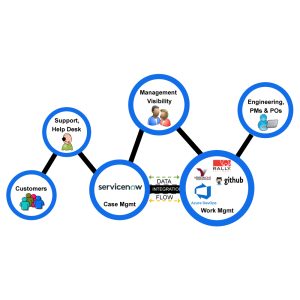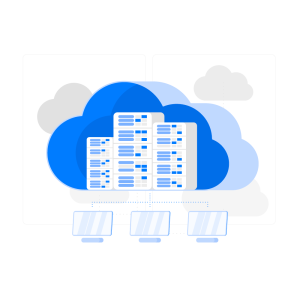The rapid evolution of enterprise IT ecosystems, driven by cloud adoption, AI-driven decision-making, and the demand for seamless connectivity, has transformed how businesses operate. However, integrating diverse applications, data sources, and systems remains a significant challenge. Traditional integration methods often fail to keep pace with the increasing scale, complexity, and agility requirements of modern enterprises, leading to inefficiencies and data silos that hinder innovation.
IBM Cloud Pak for Integration provides a next-generation hybrid integration platform designed to unify enterprise connectivity. By incorporating AI-powered automation, API lifecycle management, event-driven architecture, and secure messaging, businesses can establish a highly efficient, scalable, and intelligent IT ecosystem. This blog explores the capabilities of IBM Cloud Pak for Integration, its synergy with IBM Cloud Pak for Data, the distinctions between IBM Watson X and Cloud Pak for Data, and the importance of a robust enterprise integration strategy.
The Growing Complexity of Enterprise Integration
Modern enterprises increasingly adopt multi-cloud and hybrid IT environments to enhance operational flexibility, cost-efficiency, and resilience. However, these environments introduce substantial integration challenges that affect seamless data flow, application interoperability, and security.
Interoperability Challenges
With multiple cloud providers offering proprietary architectures, APIs, and compliance regulations, businesses struggle with cross-platform integration. The lack of standardization results in data silos, making it difficult for applications across different environments to communicate efficiently. This challenge leads to operational inefficiencies, duplicate workflows, and inconsistent data sharing, all of which can slow down business processes and reduce agility.
Data Fragmentation and Inconsistency
Data is often scattered across various legacy systems, SaaS platforms, and hybrid cloud environments. When organizations lack a centralized integration framework, they struggle with disconnected data sources, leading to delays in real-time data synchronization and inaccurate analytics. Data redundancy not only affects decision-making but also increases storage costs and complicates compliance requirements. A unified integration platform is essential to ensure seamless data exchange and maintain consistency across all enterprise systems.
Security and Compliance Risks
Hybrid IT environments create cybersecurity risks due to inconsistent security policies, access controls, and compliance measures across different platforms. To mitigate these risks, businesses need an integration platform that enforces encryption, role-based access control, and automated compliance monitoring while ensuring secure data transmission.
Operational Scalability and Performance Bottlenecks
As businesses generate vast amounts of real-time data, legacy integration methods struggle to scale effectively. Many traditional systems cannot process high-speed transactions, leading to performance bottlenecks that impact business operations. AI-driven automation and event-driven architectures play a critical role in overcoming these challenges, allowing enterprises to manage large-scale data processing while maintaining efficiency and agility.
IBM Cloud Pak for Integration: A Holistic Approach to Enterprise Connectivity
IBM Cloud Pak for Integration is a comprehensive, cloud-native integration platform designed to unify enterprise applications, data, and workflows. It provides a modular, AI-enhanced framework that accelerates digital transformation by streamlining connectivity, improving security, and enhancing scalability across on-premises and cloud environments.
- API Lifecycle Management
IBM Cloud Pak for Integration simplifies API management by offering a full suite of tools to design, deploy, secure, and monitor APIs. Enterprises can efficiently manage API lifecycles while ensuring seamless interoperability across multiple environments. The platform provides robust security features such as API authentication, data encryption, and governance policies that prevent unauthorized access and data breaches. Automated versioning further ensures that businesses can upgrade or modify APIs without disrupting existing integrations, facilitating continuous improvement in digital services.
- AI-Powered Automation in Integration
AI-driven automation within IBM Cloud Pak for Integration optimizes integration workflows by minimizing manual interventions and accelerating business processes. Intelligent data mapping automatically aligns disparate data formats, reducing errors and improving accuracy. AI-powered recommendations analyze API configurations in real time, optimizing performance based on system usage and workload distribution. Additionally, self-healing capabilities proactively detect integration failures and apply corrective measures, reducing system downtime and ensuring operational continuity.
- Event-Driven Architecture for Real-Time Processing
Event-driven integration allows enterprises to respond to real-time data changes, enhancing decision-making and agility. In financial services, this capability supports fraud detection and enables real-time transaction monitoring, helping institutions mitigate risks promptly. Similarly, in healthcare, patient data can be synchronized instantly across systems, improving diagnostics and treatment accuracy. Retail businesses can leverage real-time event processing for automated inventory management, ensuring optimal stock levels based on consumer demand fluctuations. These real-time insights provide enterprises with a competitive advantage by enhancing responsiveness and operational efficiency.
- High-Performance Messaging and Data Streaming
To support real-time data exchange, IBM Cloud Pak for Integration integrates with IBM MQ and Apache Kafka, ensuring reliable and low-latency messaging across distributed systems. Businesses benefit from:Low-latency communication between microservices, ensuring seamless application interaction,Fault-tolerant message delivery, reducing data loss risks and enhancing reliability,Scalability for high-volume transactions, enabling businesses to process millions of data events per second without degradation in performance.
- Cloud-Native and Hybrid Deployment Flexibility
IBM Cloud Pak for Integration provides enterprises with a highly adaptable deployment model, ensuring seamless application integration across diverse environments, including on-premises, private, and public cloud platforms. This flexibility is crucial in today’s hybrid IT landscape, where businesses must balance security, scalability, and performance while ensuring uninterrupted operations.IBM Cloud Pak for Integration allows businesses to scale integration processes automatically in response to fluctuating data loads.
- Enterprise-Grade Security and Compliance
Security remains a top priority, and IBM Cloud Pak for Integration integrates a comprehensive suite of protection mechanisms to safeguard enterprise data and maintain compliance with regulatory requirements. End-to-end encryption ensures that sensitive data is protected both in transit and at rest, mitigating risks associated with unauthorized access. Role-based access control (RBAC) strengthens security by restricting system access based on predefined user roles, ensuring that only authorized personnel can access critical enterprise resources.
The Collaboration Between IBM Cloud Pak for Integration and IBM Cloud Pak for Data
IBM Cloud Pak for Integration and IBM Cloud Pak for Data work in tandem to create a seamless and intelligent enterprise integration ecosystem. IBM Cloud Pak for Data serves as an AI-powered data management platform, enhancing governance, analytics, and decision-making processes. When integrated with IBM Cloud Pak for Integration, enterprises can leverage real-time data processing, AI-driven insights, and advanced automation capabilities to build a more cohesive IT environment.
The collaboration between these two platforms not only streamlines enterprise integration but also accelerates digital transformation efforts. Enterprises benefit from a highly secure, scalable, and high-performance infrastructure that supports innovation while maintaining regulatory compliance. Whether optimizing workflows, automating resource allocation, or enhancing security policies, the synergy between IBM Cloud Pak for Integration and IBM Cloud Pak for Data enables organizations to drive smarter and more efficient business outcomes.
IBM Cloud Pak for Data complements IBM Cloud Pak for Integration by offering an AI-driven data management platform that enhances data governance, analytics, and decision-making. Together, these platforms create a seamless digital ecosystem where integrated data can drive intelligent business insights. By combining advanced data integration with AI-powered analytics, enterprises can achieve real-time visibility into operations, automate complex workflows, and optimize resource allocation more efficiently.
Nexright: Your Trusted Partner for IBM Cloud Pak for Integration
Seamless integration is essential for enterprises aiming to achieve digital transformation. IBM Cloud Pak for Integration provides a comprehensive framework to facilitate efficient data connectivity, streamline workflows, and enhance operational agility. However, successful implementation requires a strategic approach and expert guidance. Nexright specializes in enterprise integration solutions, offering customized strategies, deep technical expertise, and continuous support to help businesses unlock the full potential of IBM Cloud Pak for Integration. With our proven track record in integrating complex IT environments, we enable organizations to build a robust, intelligent, and scalable enterprise IT ecosystem. Contact Nexright today to discover how we can support your integration journey and drive business excellence.




